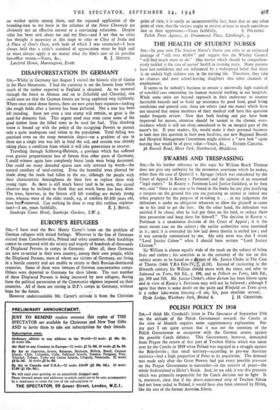SWARMS AND TRESPASSING
S,—In his further reference to this topic Sir William Beach Thomas does not give any authority for the erroneous assertions which he makes, other than the case of Quantrill v. Spragge (which was considered by the Court of Appeal in Kearry v. Pattinson) and the opinion of an unnamed "legal expert." In Kearry v. Pattinson Lord Justice Goddard, as he then was, said "there is no case to be found in the books for any plea justifying a trespass on the ground that you are pursuing an animal or indeed any other property for the purpose of re-taking it . . . in my judgement the defendant is under no obligation whatever to allow the plaintiff to come on to his land to get the bees. On the other hand, the defendant was entitled if he chose, after he had got them on his land, to reduce them into possession and keep them for himself." The decision in Kearry v. Pattinson is a unanimous decision of the Court of Appeal ; it is the most recent case on the subject ; the earlier authorities were examined in it ; until it is overruled the law laid down therein is settled law ; and it was correctly summarised by me. My only error was that I wrote "Lord Justice Cohen" when I should have written "Lord Justice Clauson."
Sir William is almost equally wide of the mark on the subject of fallen fruit and timber ; his assertion as to the certainty of the law on this subject seems to be based on a &rum of Mr. Justice Choke in The Case of Thorns (1466 Y.B.6 Edw.IV, 7, p1.18). Instead of rusticating in the fifteenth century Sir William should move with the times, and refer to Salmond on Torts, 9th Ed., p. 198, and to Pollock on Torts, 14th Ed., pp. 309 and 310. Mr. Justice Choke's obiter dictum has been blown upon and in view of Kearry v. Pattinson may well not be followed ; although I agree that there is some doubt on the point and Winfield on Torts gives it a rather luke-warm blessing.—! am, Sir, your obedient servant, Hyde Lodge, Westbury Park, Bristol 6. J. H. GRIFFITHS.


































 Previous page
Previous page